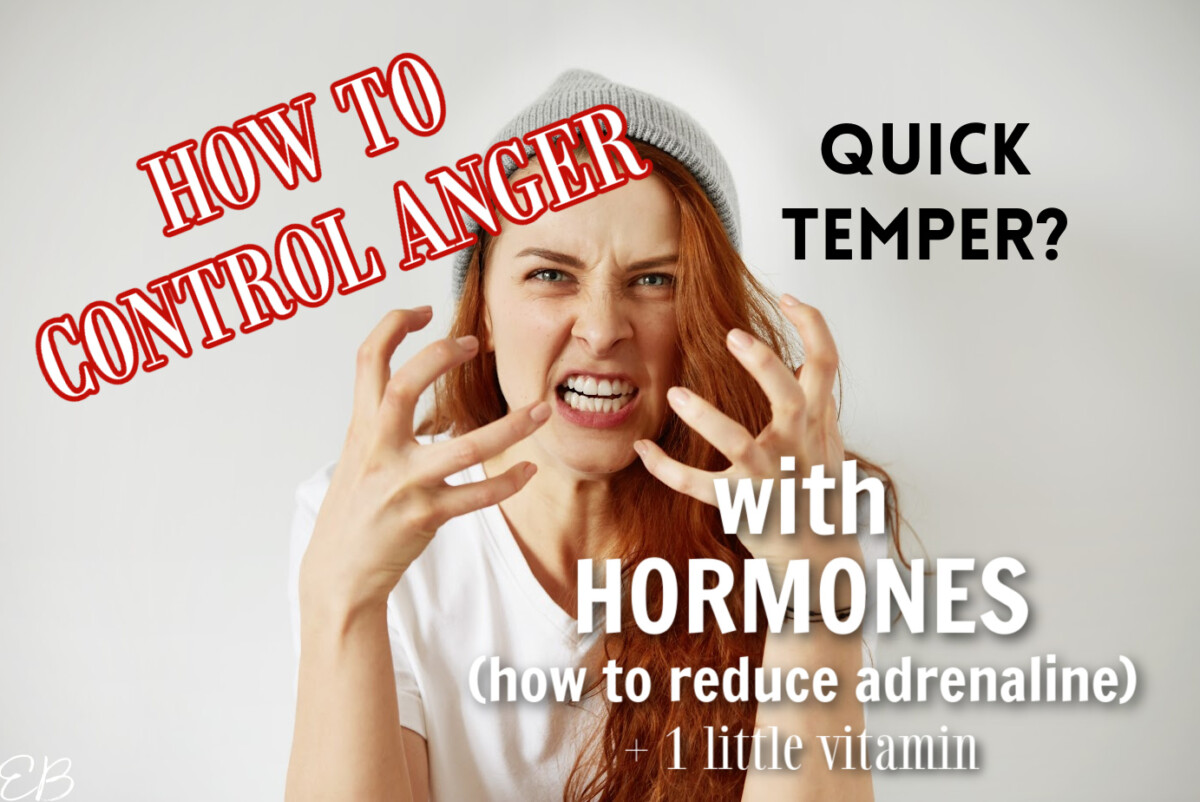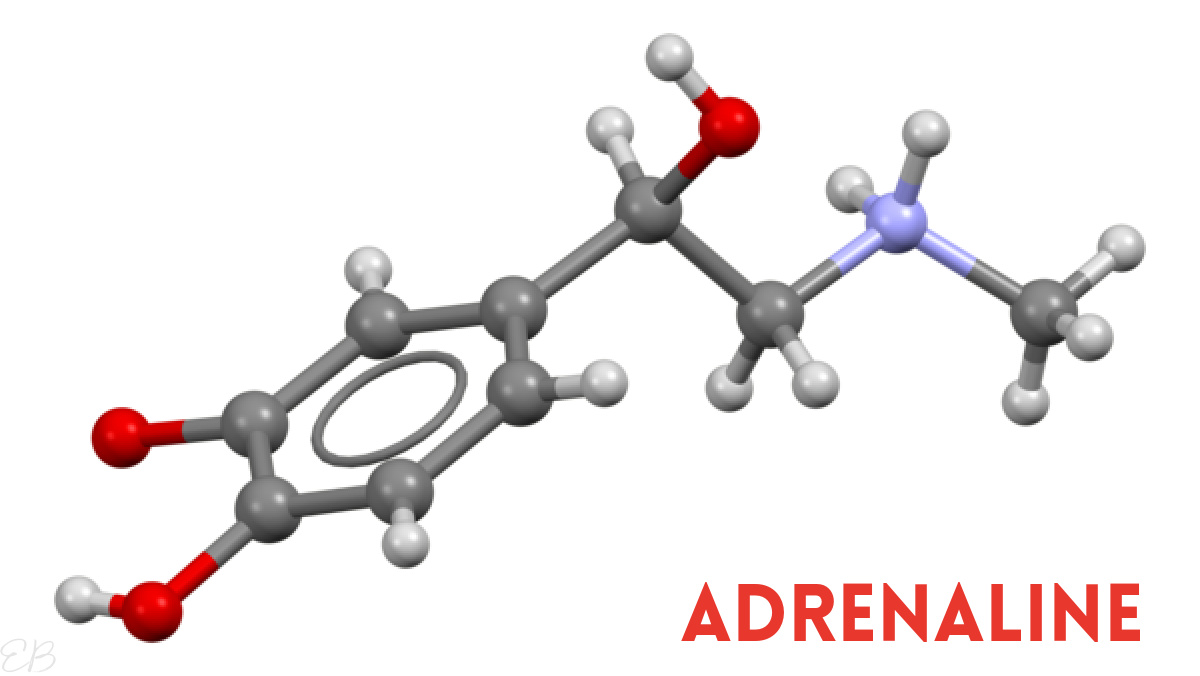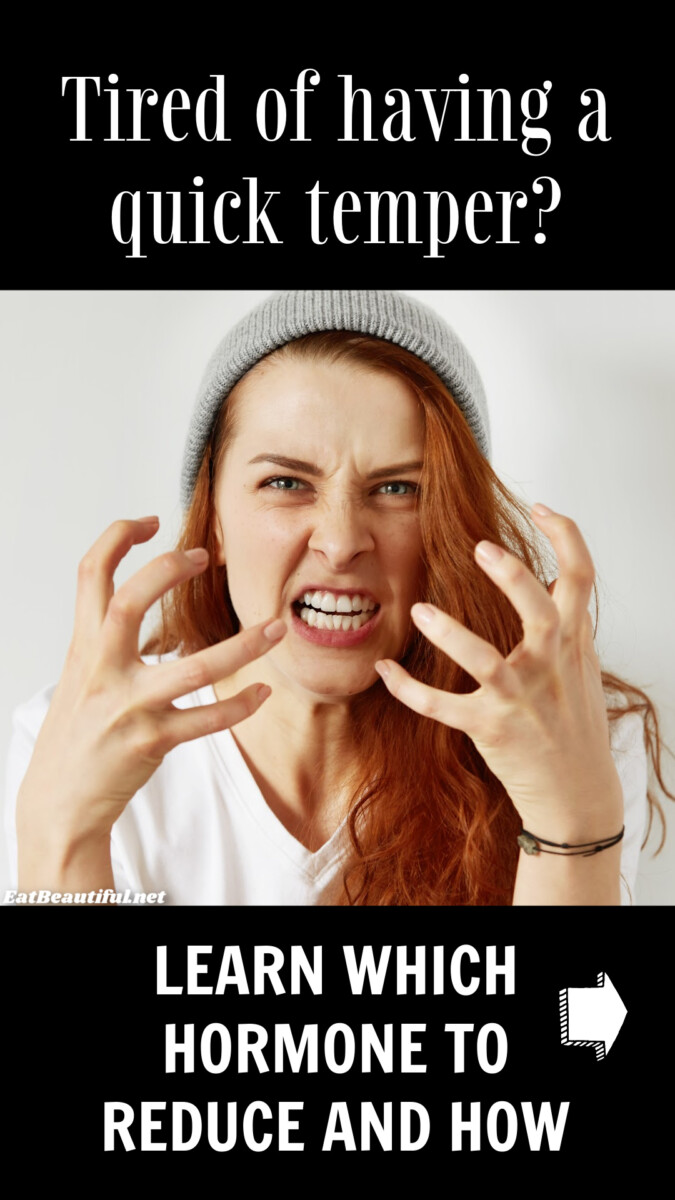I may receive a commission if you purchase through links in this post. I am not a doctor; please consult your practitioner before changing your supplement or healthcare regimen.
How to Control Anger with Hormones and Thiamine: Reduce Adrenaline & Increase B1 is an article I’ve learned about through personal experience. Tired of having a quick temper? There may be something you can do now: Learn how to reduce adrenaline, and consider one gentle vitamin.
When my kids were little (like ages 2 and 4), I struggled occasionally with a quick temper. I found over the years, that the more I healed in other ways, the more my brain healed, and this issue went away. (But there was fast improvement, too, from dietary changes!)
While we can judge and blame one another for moodiness, or feel ashamed of our own outbursts, what we should understand is: Anger is a mental health issue and can oftentimes be overcome with diet and lifestyle changes.
What is anger
Anger is an emotional response, both to a real or perceived triggering event or thought.
It can be an explosion of frustration with a person when someone is unable to communicate their feelings in a regulated way — or there’s a feeling of unfairness or being misunderstood.
Because anger is an emotional response to a stressor, it can be an over-reaction, since stress is simply how our bodies interpret a situation. If we are already experiencing a lot of challenges in our life, we are more likely to interpret and react to a situation as stressful.
Sometimes a quick temper is nothing more than an overwhelmed person over-reacting; other times anger is based in fear, shame or grief, both signifying the release of cortisol, testosterone and adrenaline.
Anger is often a symptom of something else: unresolved issues, a clinical issue such as anxiety, depression, OCD or a personality disorder, but it can also signify exhaustion of the adrenal glands.
As most of us know from experience, anger does not make you feel better.
Whose fault is it
This article is specifically intended to address our own over-reactions (or those of loved ones).
There are times when definite and actual violations occur that demand frustration and anger, but these situations are rare.
Here, we’re talking about everyday anger, the kind that flares up out of nowhere and then, if we are honest with ourselves, often deserves an apology.
While others are sometimes at fault, this article addresses how we over-react regardless of whose fault it is. Sometimes, when we’re really honest with ourselves, regardless of how we felt in the heat of the moment, if we have a perspective of grace, love and understanding, the other party is not at fault at all.
How to control anger: A 4-pronged approach
Here’s an introduction to what we’re about to discuss:
- Reduce behaviors that cause the production of adrenaline (more on this below).
- Eat an Anti-Inflammatory Diet.
- Reconsider certain thought patterns and behaviors.
- Consider one or more supplements.
With this approach, you may be addressing the root causes of your temper: dietary deficiencies, addictions, inflammation and liver toxicity, patterns of thought that need to be regulated.
The alternatives we turn to don’t work and cause more harm than good: using medications, or self-medicating with: sugar, caffeine, chocolate, cigarettes, alcohol and over-eating. Most of these deplete the main vitamin we need for balanced emotions.

What causes the release of adrenaline
Let’s talk first about the role of adrenaline (aka epinephrine) and what causes its release:
1. Stress
Adrenaline is released in times of stress, if we sense danger to ourselves or a loved one — or if we’re emotionally stressed and overwhelmed.
That last one was me: I was just deeply exhausted from raising two little ones, not having fully recovered after either birth. This meant little things pushed me over the edge.
My adrenal glands were already spent, and interestingly, the adrenals is where adrenaline in created!
Everyone’s story is different, but one thing most of us have in common is that when our stress levels are maxed out, even the smallest things can make us overreact.
The most common cause of increased adrenaline levels is emotional stress.
2. Smoking
Nicotine makes your body release adrenaline, which causes your blood pressure to rise and your heart to beat faster.
While many people use smoking as a way to handle stress, in fact, it increases the body’s sensitivity to it.
3. Caffeine and other stimulants (sugar, chocolate etc)
Here’s another great example of: What makes us feel good now, makes us feel worse later.
This category was my personal oversight. I ate chocolate to give me some pep and cheer in the afternoons when I started to feel exhausted, but then I’d over-react to little situations as a result, when the chocolate wore off. The high it provided had an equally proportionate and corresponding low.
As soon as I realized the correlation, I completely quick dark chocolate, and the results and improvement were immediate.
4. Medications, such as anti-depressants
5. Anxiety
Whenever we feel anxious, the body sends a rush of adrenaline.
Mental health mindset: Negativity, frustration and anger
Anger starts with frustration. If we can avoid frustration with others, we stop anger before it starts.
Quotations sometimes help us because we find power from words, a change of perspective.
I actually like an Einstein quote for this reason: “Stay away from negative people. They have a problem for every solution.” What I have found is that negativity and assuming the worst of someone else is a sign of mental health challenges (that alienates people).
Having ruminating and judgmental thoughts is not shameful; it’s just something we should change — not only because it’s an unhealthy way to live and have relationships, but because — and this is little discussed: Our mental health is a reflection of our overall and especially our liver health!
If we aren’t well in our heads, our bodies are not well either. Fix the diet, fix the liver, and those thought patterns will change, too, especially if we humbly acknowledge them and want to change.
How to fix the liver? Here’s my doctor’s information. His area of expertise is the liver. I love the diet he’s helped me to follow and all the mental health benefits I’ve seen from it.
Start with the decision to change, then examine your diet and thought patterns. Address both.
If you need a quicker way to change your diet and mental health, I also love this simple Anti-Inflammatory Diet.
Why high adrenaline causes anger
When adrenaline levels are high, we feel agitated, irritable, angry, and focused in a targeted sort of way.
If the stress continues, these feelings are oftentimes followed by depression and anxiety.
To reduce adrenaline levels so that they don’t build up, there are many actions we can take.

How to reduce adrenaline
- Eliminate behaviors that cause adrenaline production: stress, smoking, caffeine and other stimulants (sugar, chocolate etc), anxiety … and with the assistance and approval of your doctor, when the time is right: medications and anti-depressants.
- A diet high in sugar, including sugary drinks, causes elevated levels of adrenaline. Sugar gives quick bursts of energy similar to what happens when we need to fight or flee from something that scares us. Not healthy for everyday!
- How to reduce anxiety: start the right diet (a lot of these factors affect each other), pray, consider breath work, exercise, get enough sunlight or similar (in winter: like this, this or with a sunlamp; I have the Fiji model and use it all winter), practice grounding/earthing, choose joy, be intentional about mindset, consider neurofeedback.
- Seek ongoing help for alcoholism. (Do not replace alcohol with sugar, because sugar turns into alcohol in the body, which is why it feels good to make the replacement. Do not replace alcohol with cigarettes.)
- Begin an Anti-Inflammatory Diet.
- Engage in physical activity. Sports have been proven to reduce adrenaline levels in the body, which reduces feelings of tension and over-excitement.
- Consider Vitamin B1 supplementation, also called Thiamine.
If we don’t reduce the production of adrenaline, many symptoms can result from long term exposure to high levels of this hormone.
Thiamine deficiency causes anger
In addition to stress and stress-related choices, diet and dietary deficiencies play a significant roll in outbursts of anger.
Here are some frequently asked questions:
Does thiamine deficiency cause irritability?
A deficiency in Thiamine, or Vitamin B1, causes mood issues, including anger and depression.
Thiamine deficiencies are caused by alcoholism, smoking, a diet of restaurant foods or processed foods, diets high in refined grains and sugar.
Surprisingly, they are also caused by diets high in cruciferous vegetables (cabbage, broccoli and cauliflower are examples) and polyphenols (like those found in tea, dark chocolate, coffee and spices).
Is B1 good for fight or flight?
Is B1 good for adrenal glands?
Vitamin B1 is particularly important for adrenal gland recovery.
I wish I’d known after each of my pregnancies!
What diet is best for anger control?
The easiest one is an Anti-Inflammatory Diet like this.
Or learn more about a low vitamin A diet here. (This diet also reduces copper, aldehydes and other compounds you learn about along the way.)
Minerals required for Thiamine assimilation
Thiamine works better if one’s electrolytes are balanced first: magnesium, selenium and sodium.
Read more about this topic and how to find your Vitamin B1 dose here.
How to control anger with behavioral choices that reduce adrenaline
Experts have a variety of helpful steps that prove very useful. See which of these will work best for you:
- Let your first word be a breath — Allowing you to breath in calm, grace and really think about what needs to be said, say what you need to say in as few words as possible.
- Realize that we often use people as outlets. What we get angry about is probably not worthy of the reaction. Instead, consider what’s making you over-react: not enough sleep, another struggling relationship, poor health that makes your tension levels high. Take time away to address the real cause, and apologize when you mistake your own issues for someone else’s. Repent in your own thoughts and own your mistake. (If someone else is really at fault, we can still control our reaction.)
- If you apologize, do so with a period, not a comma: Simply say you’re sorry, and mean it; don’t use it as an excuse to continue to accuse (as in, “I’m sorry, but …”).
- We don’t have to win an argument. It’s lonely and unnecessary. Instead, cultivate understanding.
- In the midst of an argument, understand feelings can take precedent over logic. Validate feelings to resolve an argument.
- Want the best thing for the other person. But don’t assume you know what that is.
- Extend grace. Let us be patient with others, and work on ourselves.
How to control anger Conclusion
If you’re struggling with bursts of anger, consider these solutions:
- Reduce adrenaline (see sections above for the many ways how).
- Recognize what’s happening in your body, and as a result, commit to not having controversial conversations.
- It’s in these moods we end up saying more than we should with an attitude of criticism. Do not begin to critique anyone’s behavior or even share how you’re feeling, as these are openings for anger to begin, well up and become uncontrollable.
- Learn to recognize the first signs of frustration, so you can replace it with thankfulness! (Frustration precedes anger.)
- Focus on what you’re grateful for instead of what you don’t like in someone else.
- Get your diet right.
- Consider Vitamin B1 supplementation.
- Cut out addictions (even seemingly small ones like sugar, tea and coffee).
- Find accountability. Whether it’s a friend, a support group you’re committed to or a spouse. Confess, so you are more self aware and have to report to someone else. This helps with prevention for multiple reasons.
You can Pin this article here:


Naomi V Snider says
Haven’t read the post yet, but planning to later today or tomorrow. Just wanted to say how much I enjoyed your comments in the email you sent to announce this post. It was absolutely precious! I’ve always heard that the B vitamins have been called the “be happy” vitamins, and I’m sure that when our Creator designed our bodies he also gave us the kind of food we need to stay healthy and happy. We have veered from the path that He intended for us and now we suffer. I’m glad to see you addressing this topic. I for one don’t have the finances to purchase all the supplements that I probably need to restore my body to some semblance of health, or should I say of less illness, so it’s good news to learn of less costly ways to accomplish some of these things. I know from your last post that B1 is very affordable and have ordered some, Thank you so much for your commitment to help so many people, Megan.
Megan says
Thank you, Naomi, for your kind and thoughtful comments. I totally agree and love also how affordably we can address this challenge. I’m so glad the B1 is a good option for you, and I hope you find it helpful. I’m glad, too, you enjoyed the story about our daughter. 🙂 xx Best!
Chris Turack says
I was looking at the specs on the Sperti website and they state that the UVA/UVB ratio for the Fiji lamp is now 75/25 and for the Vitamin D lamp is now 20/80. Maybe they changed their output? My question is, if these are the current specs, would you now recommend the Vitamin D lamp instead? Thanks for the great article! I forwarded it to my daughter also.
Megan says
Hi Chris, good questions, and ones I asked myself. My doctor (Dr. Smith) believes the Fiji lamp is more similar to the sun’s rays, so he prefers it for general health and raising D levels/detoxing. It’s the one he has for himself. While not designed to raise Vitamin D levels, it does, just as the sun does. Being in closer ratio to the sun’s rays, he feels it’s safer, as humans often think we can improve on nature and in so doing sometimes endanger ourselves. So I still prefer the Fiji model. I hope that helps! 🙂